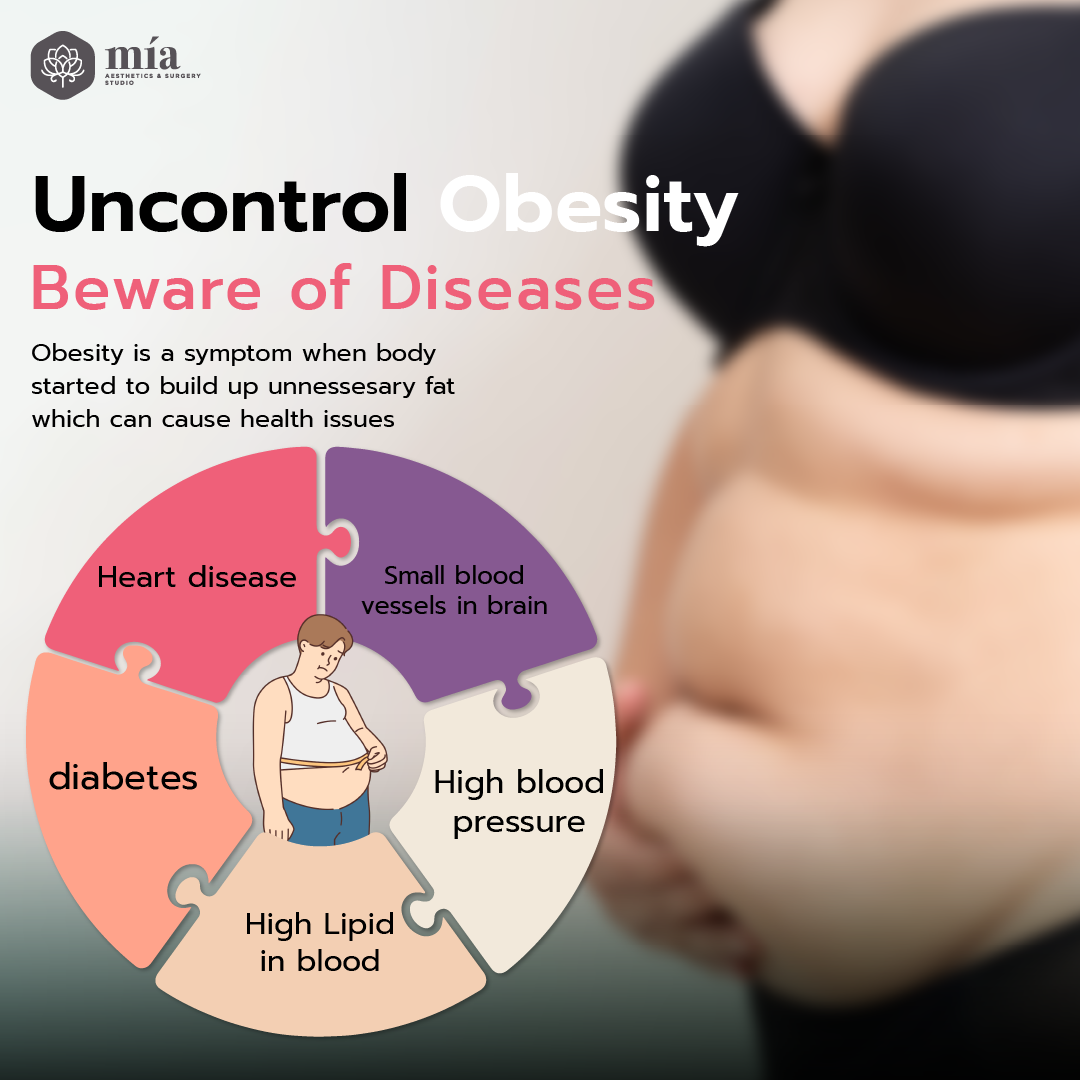ความเชื่อมโยงอันตรายระหว่างโรคอ้วนที่ควบคุมไม่ได้กับโรคร้ายแรง
โรคอ้วนเป็นปัญหาสุขภาพระดับโลกที่เพิ่มมากขึ้น และหากไม่ได้รับการควบคุม อาจเพิ่มความเสี่ยงต่อการเกิดโรคร้ายแรงหลายชนิด ตั้งแต่โรคหัวใจไปจนถึงเบาหวานและความดันโลหิตสูง การทำความเข้าใจเกี่ยวกับความเสี่ยงเหล่านี้สามารถช่วยให้บุคคลตระหนักถึงแนวทางป้องกันเพื่อสุขภาพที่ดีขึ้น
โรคอ้วนที่ควบคุมไม่ได้ส่งผลต่อสุขภาพอย่างไร
1. โรคหัวใจและโรคอ้วน
โรคอ้วนเป็นปัจจัยเสี่ยงหลักของโรคหัวใจ ไขมันส่วนเกินในร่างกายทำให้ระดับคอเลสเตอรอลสูงขึ้น ความดันโลหิตสูง และเกิดการอักเสบ ซึ่งล้วนแต่เป็นสาเหตุของปัญหาหัวใจ ไขมันที่สะสมในหลอดเลือดสามารถนำไปสู่ภาวะหลอดเลือดตีบ เพิ่มความเสี่ยงของโรคหัวใจวายและโรคหลอดเลือดสมอง
2. โรคเบาหวานและภาวะดื้อต่ออินซูลิน
โรคเบาหวานประเภทที่ 2 มีความสัมพันธ์โดยตรงกับโรคอ้วน ไขมันส่วนเกินส่งผลกระทบต่อความไวของอินซูลิน ทำให้ร่างกายควบคุมระดับน้ำตาลในเลือดได้ยากขึ้น เมื่อเวลาผ่านไปอาจเกิดภาวะดื้อต่ออินซูลิน ซึ่งนำไปสู่ระดับน้ำตาลในเลือดสูงเรื้อรังและส่งผลให้เกิดภาวะแทรกซ้อนร้ายแรง เช่น ไตเสื่อม ระบบประสาทเสียหาย และปัญหาการมองเห็น
3. หลอดเลือดขนาดเล็กในสมองและภาวะสมองเสื่อม
โรคอ้วนมีความเกี่ยวข้องกับความเสียหายของหลอดเลือดขนาดเล็กในสมอง ซึ่งอาจนำไปสู่ภาวะสมองเสื่อมและความบกพร่องทางสติปัญญา ระบบไหลเวียนเลือดที่ไม่ดีและความดันโลหิตสูงทำให้สมองได้รับออกซิเจนน้อยลง ส่งผลกระทบต่อการทำงานของสมองและเพิ่มความเสี่ยงต่อโรคหลอดเลือดสมอง
4. ความดันโลหิตสูง (Hypertension)
น้ำหนักตัวที่มากเกินไปทำให้หัวใจต้องทำงานหนักขึ้นในการสูบฉีดเลือด ซึ่งนำไปสู่ภาวะความดันโลหิตสูง ภาวะนี้เป็นปัจจัยเสี่ยงสำคัญของโรคหัวใจ โรคหลอดเลือดสมอง และไตวาย ความดันโลหิตสูงมักถูกเรียกว่า "นักฆ่าเงียบ" เพราะไม่มีอาการชัดเจนแต่สามารถนำไปสู่ปัญหาสุขภาพร้ายแรงได้
5. ภาวะไขมันในเลือดสูง (Hyperlipidemia)
โรคอ้วนทำให้ระดับไขมันในเลือดผิดปกติ โดยเฉพาะการเพิ่มขึ้นของคอเลสเตอรอลชนิดไม่ดี (LDL) และลดระดับคอเลสเตอรอลชนิดดี (HDL) ภาวะนี้ส่งผลให้หลอดเลือดอุดตัน เพิ่มความเสี่ยงของโรคหัวใจวายและโรคหลอดเลือดสมอง
วิธีป้องกันและจัดการความเสี่ยงจากโรคอ้วน
-
รับประทานอาหารที่ดีต่อสุขภาพ – ควรเน้นอาหารที่มีประโยชน์ เช่น โปรตีนลีน ผัก ผลไม้ และไขมันดี หลีกเลี่ยงอาหารแปรรูป เครื่องดื่มที่มีน้ำตาล และคาร์โบไฮเดรตมากเกินไป
-
ออกกำลังกายเป็นประจำ – ควรออกกำลังกายระดับปานกลางอย่างน้อย 150 นาทีต่อสัปดาห์ เช่น เดินเร็ว ปั่นจักรยาน หรือฝึกเวทเทรนนิ่ง
-
ตรวจสุขภาพเป็นประจำ – การตรวจสุขภาพสามารถช่วยให้พบสัญญาณของโรคที่เกี่ยวข้องกับโรคอ้วนได้ตั้งแต่ระยะเริ่มต้น
-
จัดการความเครียดและการนอนหลับ – การนอนหลับที่ไม่เพียงพอและความเครียดเรื้อรังส่งผลต่อการเพิ่มน้ำหนักและระบบเผาผลาญของร่างกาย
-
ขอคำปรึกษาจากผู้เชี่ยวชาญ – การปรึกษาแพทย์หรือนักโภชนาการสามารถช่วยวางแผนการควบคุมน้ำหนักที่เหมาะสมสำหรับแต่ละบุคคล
สรุป
โรคอ้วนที่ควบคุมไม่ได้เป็นปัจจัยเสี่ยงสำคัญของโรคร้ายแรง เช่น โรคหัวใจ เบาหวาน ความดันโลหิตสูง และปัญหาสุขภาพสมอง การปรับเปลี่ยนพฤติกรรมและเลือกวิถีชีวิตที่ดีขึ้นจะช่วยลดความเสี่ยงและส่งเสริมสุขภาพที่แข็งแรงในระยะยาว

